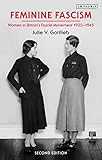Feminine fascism : women in Britain's fascist movement, 1923-1945 / Julie V. Gottlieb.
Publisher: London : I.B. Tauris, 2021Edition: Second edition.Description: xvi, 378 pages, 8 unnumbered pages of plates : illustrations (black and white).Content type: text | still image Media type: unmediated Carrier type: volumeISBN: 9780755627325; 9780755633654; 9780755633647.Subject(s): Fascism and women -- Great Britain -- History -- 20th century| Item type | Current library | Class number | Status | Date due | Barcode | |
|---|---|---|---|---|---|---|
| Book | House of Lords Library - Palace Dewey | 320.5330820941 GOT (Browse shelf(Opens below)) | Available | 020288 |
Previous edition: 2000.
Introduction : feminine fascism : women in Britain's Fascist movement, 1923-45 -- Feminized fascism : Rotha Lintorn-Orman and the British Fascists, 1923-35 -- Women in the British Union of Fascists : organization and forms of participation -- The ideology of feminine fascism -- The legacy of the suffragettes to British Fascism -- Mosley's women and Mosley's woman : the leader's sexual politics -- Behind bars and barbed wire : women's experiences of internment under Defence Regulation 18B, 1940-45 -- Conclusion : women, fascism and fanaticism, past and present -- Appendix : who's who in the history of women and fascism in Britain.
"The British Fascisti, the first fascism movement in Britain, was founded by a woman in 1923. During the 1930s, 25 per cent of Sir Oswald Mosley's supporters were women, and his movement was 'largely built up by the fanaticism of women.' What was it about the oBritish form of Fascism that accounted for this conspicuous female support? Gottlieb addressed these questions in the definitive work on women in fascism. This book continues to fill a significant gap in the historiography of British fascism, which has generally overlooked the contribution of women on the one hand, and the importance of sexual politics and women's issues on the other. Gottlieb's extensive research makes use of government documents, a large range of contemporary pamphlets, newspapers and speeches, as well as original interviews with those personally involved in the movement. This new edition includes a preface where Gottliev considers the changing and growing relevance of the study, and against the backdrop of current affairs. Here, she looks at the resurgence of populism, the rise of women as leaders of far-right parties across Europe and North America, and the normalization of fascism in political discourse, in the media and in fiction"-- Taken from back cover.
